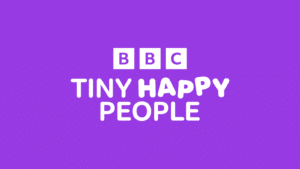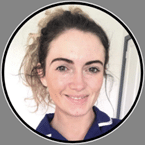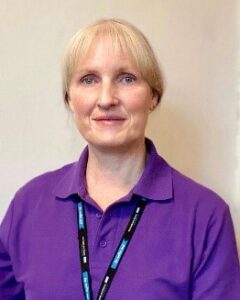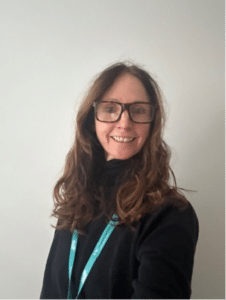6th January 2025
The BBC Tiny Happy People resource was launched in July 2020 with the aim of supporting children’s early language development through a simple underlying message: talk to your baby from as early as possible, starting with pregnancy.
They have developed an extensive library of free resources for parents and caregivers which have been specifically designed to help them develop their child’s language and communication skills through everyday routines.
On the BBC Tiny Happy People website, families will find easy to do activities, articles and child development films, as well as great tips for new parents and caregivers, and advice to support wellbeing. All content has been created to help parents and caregivers develop their children’s language and communication skills, so they get the best start in life.
The iHV has been collaborating with the BBC Tiny Happy People team since the launch in 2020 and is delighted to share the experience of three practitioners who have been using the resource to support their practice.
The Institute is also supporting an evaluation of the use of the Tiny Happy People resources and it would be fantastic if you could complete our short survey – closes 20 January 2025.
Voices from practice
Sarah Cartner, Specialist Health Visitor for 1001 Critical Days and Solihull Approach Co-Chair of the iHV Health Visiting Advisory Forum, Newcastle Hospitals NHS Foundation Trust:
Staff within health visiting teams are all too aware of the pressure and responsibility of sharing large quantities of information with families within short periods of time. The Healthy Child Programme sets out a series of ‘core contacts’ offered to all families within England to provide information, education and support about a range of topics – from the 1001 Critical Days Period and the importance of bonding and attachment on brain development, through to feeding, weaning, family mental health and core public health information – clearly a lot of information is discussed at these contacts and within a relatively short space of time!
It is helpful for teams to have access to resources they can signpost families to – resources which can provide further information or support these messages that we are sharing, giving families the opportunity to access more information as and when it is appropriate to them.
BBC Tiny Happy People (THP) offers a fantastic range of resources, both in print and online, relating to child development. Within our Health Visiting teams in Newcastle we use these resources with families to discuss all aspects of child development. I particularly find it helpful for information about speech and language/communication development and especially utilise these resources if a child has been referred for Speech and Language specialist assessment and is on a waiting list – THP’s activities and information can help suggest activities and exercises which families can try with their child whilst awaiting assessment.
It’s really reassuring, as a healthcare professional, to know that these resources are evidence based and that BBC Tiny Happy People work in partnership with reputable, well-known organisations who support child health and/or work 1-2-1 with families and children including The Royal Foundation, the iHV and Start for Life, I’d recommend them to all families and professionals working with children.
THP resources are also helpful in supporting children’s development through play, which in turn encourages the parent/carer/child relationship, bonding and attachment. We know positive interactions with our children promote oxytocin production in children and their caregivers, which can also positively impact emotional health by reducing cortisol production. We know emotional health and wellbeing is a big priority within the NHS Long Term Plan and is also one of the high impact areas of the Healthy Child Programme, so this feels like a win-win! We also know that, for some parents, it can be difficult to know how to ‘play’ with their babies and children so these suggestions can be an easy way to start those conversations and facilitate learning through play.
BBC Tiny Happy People has also provided our workforce with an opportunity to attend online champion training to make the most of the resources and how to discuss them with families and those we work with.
Catherine Hunter (HARROGATE AND DISTRICT NHS FOUNDATION TRUST), Parenting Family Peer Supporter, County Durham Growing Healthy Service 0-25:
As a 0-25 Family Health Service in County Durham, we are always looking at how we can improve outcomes for our families and how we give children the best start in life. BBC Tiny Happy People resources are very much part of our HDFT Growing Healthy 0-6 Team toolkit to engage and educate families in a way that feels relevant to them.
Our Transformation Manager suggested a session focusing on the BBC Tiny Happy People website during our team Development Day. We made links with the BBC Tiny Happy People team and received physical resources which we use with parents, showing them the QR codes that link to the relevant sections on the BBC Tiny Happy People website. The Team signpost to the website during health and development reviews and as part of interventions supporting families to make changes and support their child’s development.
At the 2-year Healthy Child Review, we use the ELIM Identification Measure and now benefit from the BBC Tiny Happy People website, resources and films on ELIM-I that support health visiting teams. In January, we will pilot an early intervention speech and language programme for families with children aged 12 months up to their two-year Review. This play-based initiative is based around the ELIM Super Communicator tips, and the wider BBC Tiny Happy People activities, to support families to become responsive communicators.
Networking has enabled us to link our partners to the resources too. The local maternity teams have integrated BBC Tiny Happy People resources into their training, highlighting antenatal bonding opportunities and baby brain development. Our colleagues at Waythrough (Drug and Alcohol Service) use the resources to support parents in their care, they particularly like the simplicity of the videos.
I often attend community events where I promote our services, and BBC Tiny Happy People resources are a key part of my display, serving as excellent conversation starters. More families are already familiar with the resources, indicating our success in spreading the word!
Families will talk about their favourite activity video, and it is easy to see they have understood the messages shared in the resources. Parents like the short, relatable videos that connect to everyday family life. Knowing they can nurture speech development while doing everyday things like sorting washing and seamlessly building learning opportunities into their daily routines seems achievable. They can see activities will not cost money or take up more time. For parents who feel overwhelmed, understanding that they are already engaging in some of the suggested activities boosts their confidence and that can encourage them to do more.
Consistent messaging from different organisations promoting BBC Tiny Happy People resources helps families feel confident that the information is valued.
BBC Tiny Happy People resources connect families to accurate, evidence-based information in a way that is easy to understand and easy for them to implement, supporting speech, language, and communication development in County Durham.
Sue Clensy 0-19 SEND Specialist Practitioner, Sheffield Childrens NHS Foundation Trust:
Here in Sheffield, we are collaborating closely with BBC Tiny Happy People to raise awareness and embed the BBC Tiny Happy People initiative throughout our Public Health key messages. The 6 High Impact areas for 0-5 Early Years and the related outcomes underpin our packages of care, delivered to families who are in receipt of a targeted and specialist intervention. BBC Tiny Happy People is a theme and resource which runs throughout both our Healthy Child Programme delivery and targeted care packages.
The BBC Tiny Happy People initiative is embedded within our universal offer with children and families, where we can share useful information and key messages at contact points. In Sheffield, the 0-19 Health Visiting service has developed pathways to support children and families regarding Health Promotion, Health and Wellbeing, Child Development and SEND.
The BBC Tiny Happy People platform hosts a wide range of resources for targeting early language and communication and increases the impact of our service, interventions and pathways. We make ‘every contact count’ with regards to supporting parents to develop the language and communication skills for children. We are in daily telephone contact with families where parents can access the 0-19 Health Visiting service for advice and support and access our well-baby clinics. We send BBC Tiny Happy People resources and links via a text messaging service directly to parents’ mobiles and as part of our clinic conversations with parents.
We have made strong links with our Speech and Language partners and Digital Lead to ensure we have a shared information platform with families regarding language and communication which utilises the BBC Tiny Happy People resource.
What’s next for Sheffield?
- We plan to embed the ELIM (Early Language Identification Measure), BBC Tiny Happy People resource alongside our mandatory 2–2½ year developmental review.
- We are reviewing our Explore, Play and Learn Pathway content to include key themes from the BBC Tiny Happy People resource.
- We plan to include BBC Tiny Happy People links on appointment letters and update our digital Health Visitor Page as part of Sheffield Children’s Hospital Resource Library.
- Health Visitor teams have started to embed the BBC Tiny Happy People resource as part of team learning and we will continue to promote this across our workstreams and pathways within our service and partners.
- We will be inviting BBC Tiny Happy People to our service in the New Year to raise awareness and the benefits of using BBC Tiny Happy People as a resource for children and families.
Parents enjoy the BBC Tiny Happy People content, especially the videos which model best practice and are evidence based. The content is relatable and provides a good foundation to base every day activates and interactions with babies and children.











